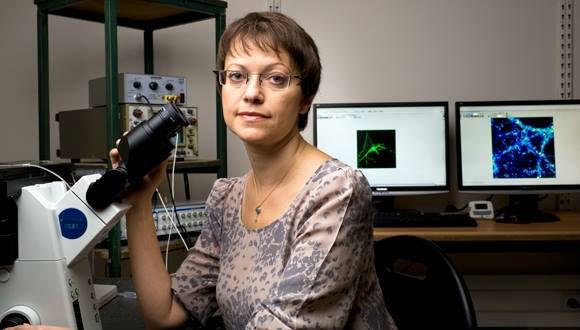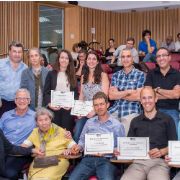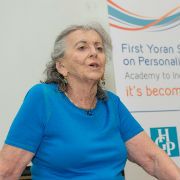Dr. Inna Slutsky Wins MetLife Foundation Prize
The prestigious Metlife Foundation Award for Research in Alzheimer’s disease has been won by Dr. Inna Slutsky of the Department of Physiology and Pharmacology at TAU’s Sackler Faculty of Medicine and Sagol School of Neuroscience. Dr. Slutsky is a faculty member of TAU's Sackler School of Medicine and Sagol School of Neuroscience.
For the past 30 years, the Metlife Foundation has been presenting annual awards for significant advances in Alzheimer’s disease research. Past winners include four Nobel Prize winners and 39 winners of the Potamkin Prize. In 2016, the four winners received awards totaling $350,000. Dr. Inna Slutsky received the Promising Investigator Award in recognition of her innovative work in studying the transition from normal synaptic function to dysfunctions at the early stages of Alzheimer's disease.
Dr. Slutsky has been researching how memories are created and maintained, and what causes individuals to lose their ability to remember. She has focused her research on the breakdown of communication between brain cells, in particular in the pathology of Alzheimer’s disease.
It is commonly held that curing Alzheimer’s involves targeting amyloid beta proteins that form plaque accumulations in the brain. Turning this supposition on its head, Dr. Slutsky has gained the insight that amyloid beta has a critical role in normal brain activity. She and her team discovered that communication between cells is compromised when production of amyloid beta around synapses is blocked. Her results predict that lowering the protein’s concentration too far might be just as damaging as a higher, toxic level of amyloid beta accumulation. Furthermore, Dr. Slutsky's team has identified specific properties of neuronal activity that regulate the levels of various forms of amyloid beta.
One of the most striking and creative aspects of Dr. Slutsky’s work is that it utilizes an integrated system of advanced imaging tools, high resolution optical imaging, electrophysiology, molecular biology, and biochemistry. Dr. Slutsky believes the integrated system that she has developed will contribute to a better understanding of how AD-related neuronal and synaptic dysfunction begins. Her goal is to set the groundwork for establishing guidelines and therapies for preventing aberrant brain activity associated with Alzheimer's disease.
“Dr. Slutsky’s work has significant implications for the development of any treatment targeting amyloid beta accumulation or clearance,” cited the prize committee.
Dr. Slutsky’s research receives funding from the Sheila and Denis Cohen Charitable Trust, European Research Council, Israel Science Foundation, Legacy Heritage and Binational Science Foundation and the Rosetrees Trust of the UK.
Watch the video to learn abotu her groundbreaking work on Alzheimer's disease or visit the Slutsky Lab website: http://www.slutskylab.com/
Dr. Slutsky is a faculty member of TAU's Sackler School of Medicine and Sagol School of Neuroscience.






